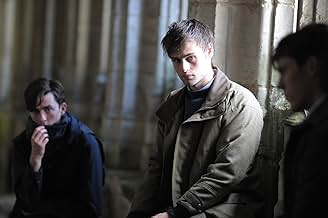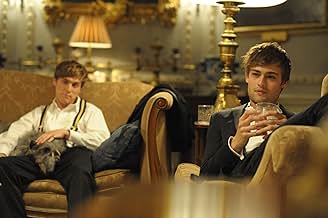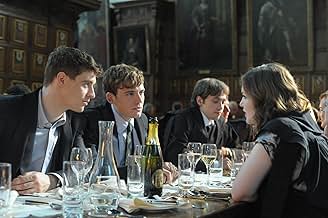अपनी भाषा में प्लॉट जोड़ेंTwo first-year students at Oxford University join the infamous Riot Club, where reputations can be made or destroyed over the course of a single evening.Two first-year students at Oxford University join the infamous Riot Club, where reputations can be made or destroyed over the course of a single evening.Two first-year students at Oxford University join the infamous Riot Club, where reputations can be made or destroyed over the course of a single evening.
- पुरस्कार
- 2 कुल नामांकन
फ़ीचर्ड समीक्षाएं
These are entitled rich brats. None of them are that compelling as individual characters. Most of them are too interchangeable. Their hi-jinx are annoying and not particularly imaginative. It's a lot of drinking and destruction. Throwing in Natalie Dormer as a hooker does help. There is boring boorish talk and a couple of interesting moments. The scene with Lauren in the restaurant is wrong. It's excusable that Miles is drunk but Lauren is too slow on the uptick. Even then, Miles can't be that weak-minded. It makes no sense that he doesn't leave to chase after Lauren other than for the sake of the story. There are a few clunky moments. It's unbelievable that the guys don't do more than a night in the drunk tank. They walk out with their clothes which should be taken as evidence. The only way to make it all work is if the cops are bought off right away. The possibility is there but it's not sharp enough.
The Riot Club begins with the group looking to recruit two new starters, as Alistair (Sam Claflin) and Miles (Max Irons) emerge as possible candidates. However, over the course of a single evening, the club's reputation is put on the line.
The film itself is very much an emotional roller-coaster. Initially, there are plenty of laughs to be had, mostly executed through witty one-liners, though it becomes a lot darker with some shocking scenes that make for extremely uncomfortable viewing. It's the latter which highlights the film's superb acting, as the young cast give genuinely convincing performances. Holliday Grainger, who plays Lauren - Miles' love interest, particularly stands out here.
Playwright Laura Wade adapted the film from her own play "Posh", and it clearly shows, as a large portion of the film is based at the table in the restaurant. While it comes as a slight disappointment that The Riot Club doesn't stray too far from its theatrical origins, it does seem to work in the film's favour, adding to the suspense before the highly dramatic climax.
Wade unsubtly incorporates a number of themes in The Riot Club that are reflective of the society we live in, including the inherited privilege and power culture in the country. There's also a lot of political satire, which comes as no surprise considering some of The Bullingdon Club's ex-members include the current British Prime Minister David Cameron, Chancellor of the Exchequer George Osborne and Mayor of London Boris Johnson.
Overall, The Riot Club is an excellent play-adaptation that makes for a highly gripping film. There's laughs a plenty, shocks a plenty and a great cast. This is a must-see.
A secret Oxford University club where if you have to ask to join you can't be a member who are all from affluent backgrounds and think they are better than anyone beneath their social standing.
We see how the club begins from its origins to modern day with the group needing new recruits . We see the process and induction of the new members and quickly realise that they are raucous to the extreme. They are preparing to book the annual meal and have to leave Oxford and end up in a beautiful family orientated gastro pub.
As the drink flows and the drugs are consumed the behaviour of the group becomes excessive. A pre arranged prostitute refuses to co-operate which infuriates the members further.
A violent assault tests their loyalty to each other and is played out with the involvement of outside parties.
Alistair (Sam Claflin) and Miles (Max Irons), both aristocratic and with either latent or pronounced class prejudices, begin their first term at Oxford University. Their social standing makes them attractive prospects for the infamous Riot Club. With a maximum membership of ten at any time, mystery surrounds the exclusive, secret society that has a closer bond than the Masons and a legendary penchant for excess, debauchery and a privileged standing that means the members never suffer the consequences of their hedonism. Banned from Oxford's finer establishments, the Club prepares for their annual dinner and the investiture of their news members.
I'm not sure The Riot Club has anything much to say. Is it a piece of social commentary? If so, we already know there are those who are moneyed, privileged and get away with murder, sometimes literally. If it is to excite us and make us hanker for the greener grass on the other side of the fence, it fails; why would we want that? If director Lone Scherfig (One Day, An Education) is aiming to show us how fortunate we are not to be part of that world, then surely there are subtler ways of doing so.
The Riot Club isn't a bad film; it is just a largely unpleasant one. This is a voyeuristic look through a grimy window at a display of wanton abandon and viciousness at the expense of absolutely everyone who isn't, or wasn't, part of The Riot Club. While most naughty boys think they can get away with scrumping apples, bunking off school and firing catapults at innocent, harmless animals, these are loathsome, obnoxious boys who grew up on a campaign of hatred and swapped their misdemeanours for felonies like vandalism, violence, and rape.
Nice club! Perhaps for those who have been through that educational experience and are part of that tiny segment of society of privileged society it means something. Certainly the man behind me laughed periodically in apparent understanding. He was the only one in our small audience. Me? I felt uncomfortable through most of it, particularly with the pseudo morality of Miles when he apparently tries to do the right thing and rise above it, though his peers do not hold back in reminding him he, too, is there by choice.
The Riot Club is well performed by all, the attention to detail feels meticulous, from the perspective of one on the outside, and, yes, there is a part of me that enjoyed it. It was a fascinating experience that repulsed me frequently and left me feeling rather dirty; a little like the evening I had rotten.com inflicted on me by a long-eschewed former colleague.
I suspect The Riot Club will have a limited audience and most of those who venture out will find something within it to fascinate them. I can't imagine many in my circle of friends wanting a repeat viewing or wishing for a life in the inner circle of society afterwards, though.
Well constructed, fascinating and repulsive, The Riot Club is a classic example of a film that is good, despite the subject matter being thoroughly unpleasant.
For more reviews from The Squiss, subscribe to my blog and like the Facebook page.
That said, the writer, Laura Wade, explores some very complex issues regarding wealth and peer pressure. While these themes have been depicted in movies over and over again, she does not imply that the entire upper class is a bunch of arrogant pricks, who think they can buy their way out of everything. Clearly, they can, you can't really fault them for that, but the Riot Club is not inherently an evil society. They are rich, they drink, and they sometimes lose control, as we all do. The difference is that there are no consequences for them, so they can keep on doing it. I liked how peer pressure was depicted in this film and how the guilt and responsibility of some of the members was shown. It really made me consider how we act in situations we have very little control over and how responsible should we feel in these kinds of situations.
My only complaint about the movie would be the main character (Miles Richards) being a flawless Mary Sue - rich, handsome, witty, intelligent, kind and well meaning, as well as some of the other positive characters being presented as these morally superior beings. That felt very strange for a movie, the main idea of which is that not everything is as black and white as it seems, and we all just try to justify our own actions while doing what we feel (not think) is best.
क्या आपको पता है
- ट्रिवियाThe film was originally a successful play 'Posh' that premiered at the Royal Court Theatre in London in 2010, before transferring to the London West End.
- गूफ़When Charlie comes to the pub she is handed a glass of champagne. With different camera angles the champagne flute turns to a shot glass then back to a champagne flute.
- भाव
[as Alistair is using a cash machine, two muggers walk up close behind him]
Mugger: [pulling out a knife] Don't scream. Don't look at me. Just put in the PIN number, take out 200.
Young Hooded Man: Come on, put in the fucking PIN number!
Alistair Ryle: [as he waits for machine to give him the money] It's uh, it's actually just "PIN".
Mugger: What?
Alistair Ryle: The N stands for number, it's Personal Identification Number. So, if you say "PIN Number" you're saying "number" twice. You're saying "Personal Identification Number Number". It's just... it's just wrong.
[the second mugger shoves him and he bangs his head against the wall and falls to the ground]
Mugger: You think you're fucking clever?
Alistair Ryle: Jesus, please!
Mugger: Shut it, you posh twat. Pompous little prick.
[he spits on him and walks away]
- कनेक्शनFeatured in Projector: The Riot Club (2014)
टॉप पसंद
- How long is The Riot Club?Alexa द्वारा संचालित
विवरण
- रिलीज़ की तारीख़
- कंट्री ऑफ़ ओरिजिन
- आधिकारिक साइट
- भाषा
- इस रूप में भी जाना जाता है
- Hội Trác Táng
- फ़िल्माने की जगहें
- Winchester College, Winchester, Hampshire, इंग्लैंड, यूनाइटेड किंगडम(Oxford University)
- उत्पादन कंपनियां
- IMDbPro पर और कंपनी क्रेडिट देखें
बॉक्स ऑफ़िस
- US और कनाडा में सकल
- $7,734
- US और कनाडा में पहले सप्ताह में कुल कमाई
- $2,188
- 29 मार्च 2015
- दुनिया भर में सकल
- $35,17,925
- चलने की अवधि1 घंटा 47 मिनट
- रंग
- ध्वनि मिश्रण
इस पेज में योगदान दें









































